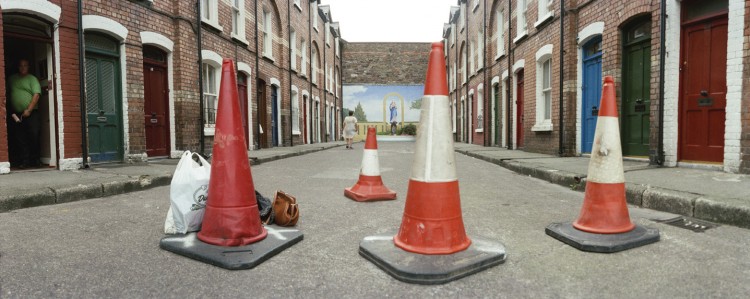
The Irish State has long seen the Traveller's existence as a problem. The local authorities try to assimilate them into society by giving them housing and education, assaulting and meat mincing them to a point where Travellers are ambiguous about their own identity. Undermined by their settlement, facing extreme brutality by the State on a daily basis, the Travellers are impoverished both psychologically and economically.
Irish Travellers formerly travelled in rural areas and performed a variety of trades and services, most notably tinsmithing, horse-dealing and peddling, living in tents and horse-drawn waggons. Today concentrated around Dublin they are the last indigenous itinerant group left in Europe. They now tow their caravans with cars and work mainly in the scrap metal trade but they persist in keeping horses even though they have little commercial value because they represent the waning Traveller cultural identity and the symbol of what little freedom they have left. Now the authorities are taking that too.
The Control of Horses Act was passed in 1996 and has since been enforced in Dublin and its surrounding areas : The Dublin City Control Area. Under the Act every owner must obtain a license for his horse, where a microchip for identification purposes is implanted in its ear. To obtain this license the owner must pay an annual fee and each horse must have at least half an acre of grazing land and a stable. Even for settled Travellers it is very difficult to fulfill these criteria. If these requirements are not met the local authorities confiscate the horse and if a license is not obtained within a certain delay, the horse is either sold on or, if nobody wants to buy it, it is put down.
In recent years a disturbing practice by local authorities has been to employ private security companies to enforce evictions and horse confiscation. All Travellers and community workers who have witnessed these interventions spoke of the blatant disrespect for Traveller life, limb and property displayed by these security firms, who operate outside the tight restrictions confining the Gardai. During one intervention in a Dublin suburb there were broken arms and legs, where one woman was injured when a forklift truck drove right into her. According to many sources these "companies" are simply hired thugs picked up in local pubs. Local authorities knowingly break the law, knowing that Travellers won't take them to court as they don't know the law or the right legal procedures to take.
Understandably due to the Horses Act, Travellers are now very secretive about their horses, afraid to tell people about their existence or to let their where abouts be known. They hide them in the most unlikely places : inside caravans, in junk yards behind piles of cars, in ruined houses and in shacks.
Resulting from the defiance of the Horses Act, Sulky racing or Trotting has become extremely popular amongst Traveller groups in the Dublin region. These races are illegal so their venue is kept secret up until the last minute, held early in the morning or late at night on a two mile stretch of main road somewhere in the Dublin region. The races have become the main social venues for Dublin's Traveller communities, where a winning horse can earn its owner up to £20,000. For many this is the Traveller's last stand, struggling against odds to overcome a disastrous economic situation, trying to hold onto their horses, up against an imposed integration where their culture and identity are at stake.

Town Centre, Cork. More than half of the Travellers in Ireland now live in trailer-caravans or prefabricated houses on special camp sites or in publicly provided housing. "Gipsies prefer to be called 'travellers' as they think that term is less derogatory. This might suggest a wish to lose their separate, distinctive identity so far as the general public is concerned. Half or more of them live in houses, like most other people. Have gipsies now lost their separate, group identity, so that they are no longer a community recognisable by ethnic origins?" - Court of Appeal Judge, England, July 1988.